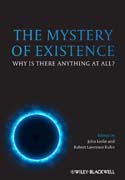
The Mystery of Existence: Why Is There Anything At All?
Leslie, John
Kuhn, Robert Lawrence
This compelling study of the origins of all that exists, including explanations of the entire material world, traces the responses of philosophers and scientists to the most elemental and haunting question of all: why is anything here—or anything anywhere ? Why is there something rather than nothing? Why not nothing? It includes the thoughts of dozens of luminaries from Plato and Aristotle to Aquinas and Leibniz to modern thinkers such as physicists Stephen Hawking and Steven Weinberg, philosophers Robert Nozick and Derek Parfit, philosophers of religion Alvin Plantinga and Richard Swinburne, and the Dalai Lama. The first accessible volume to cover a wide range of possible reasons for the existence of all reality, from over 50 renowned thinkers, including Plato, Aristotle, Aquinas, Descartes, Leibniz, Hume, Bertrand Russell, Stephen Hawking, Steven Weinberg, Robert Nozick, Derek Parfit, Alvin Plantinga, Richard Swinburne, John Polkinghorne, Paul Davies, and the Dalai Lama Features insights by scientists, philosophers, and theologians Includes informative and helpful editorial introductions to each section Provides a wealth of suggestions for further reading and research Presents material that is both comprehensive and comprehensible INDICE: About the Editors vi Acknowledgments vii 1 General Introduction (pages 1–12) 2 Some Quotations Leibniz, Kant (page 13) Schopenhauer, William James, George Santayana, Ludwig Wittgenstein, Bertrand Russell, J.J.C.Smart (14) John A. Wheeler, Stephen Hawking, Steven Weinberg (15) 3 Possible Responses to Why Anything? Nicholas Rescher (pages 16–17) 4 First Solution: A Blank is Absurd Editorial Introduction (pages 18–24) F.H. Bradley, Henri Bergson (24) Bede Rundle (25–26) David Lewis (26–30) Peter Unger (30–38) Steven Hawking and Leonard Mlodinow (39–40) 5 Second Solution: No Explanation Needed Editorial Introduction (pages 41–46) Epicurus (46–47) Hume (47–49) Fred Hoyle (49–50) W.B.Bonnor (51–52) Bertrand Russell and F.C.Copleston (53–56) Adolf Grünbaum (56–70) 6 Third Solution: Chance Editorial Introduction (pages 71–77) Alan Guth (77–82) Stephen Hawking (82–90) Alex Vilenkin (90–98) Martin Rees (98) Peter van Inwagen (98–100) 7 Fourth Solution: Value/ Perfection as Ultimate Editorial Introduction (pages 101–109) Plato (109–110) Aristotle (110–111) Plotinus (111–112) Aquinas (112–113) Anselm (113–114) Descartes (114–115) Alvin Plantinga (115–118) Spinoza (118–119) Leibniz (119–122) Hegel (122–123) A.C.Ewing (123–124) Keith Ward (125) John Polkinghorne (125–126) John Leslie (126–141) 8 Fifth Solution: Mind/ Consciousness as Ultimate Editorial Introduction (pages 142–147) Richard Swinburne (147–153) Timothy O?Connor (153–155) William Lane Craig (155–159) Sayyed Hossein Nasr (159–160) Tenzin Gyatso, Dalai Lama XIV (160–161) Andrei Linde (161–163) Paul Davies (163–170) 9 Fine–Tuning and Multiple Universes Editorial Introduction (pages 171–178) John Polkinghorne (178–189) Leonard Susskind (189–192) Steven Weinberg (192–194) Max Tegmark (194–206) Robin Collins (207–210) 10 The Problem Seems Genuine Editorial Introduction (pages 211–219) Derek Parfit (220–237) Robert Nozick (238–246) Robert Lawrence Kuhn (246–278) Michael Heller (278–284) Nicholas Rescher (284–288) Bibliography and Further Reading 289 Index of Names 310 Index of Concepts 313
- ISBN: 978-0-470-67354-6
- Editorial: John Wiley & Sons
- Encuadernacion: Cartoné
- Páginas: 328
- Fecha Publicación: 09/04/2013
- Nº Volúmenes: 1
- Idioma: Inglés
